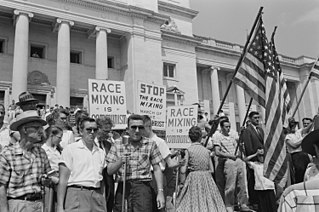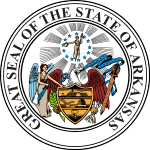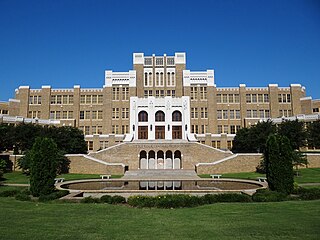
Winthrop Rockefeller was an American politician and philanthropist, who served as the first Republican governor of Arkansas since Reconstruction. He was a third-generation member of the Rockefeller family.
Joe Edward Purcell was Acting Governor of Arkansas for six days in 1979 as well as Arkansas Attorney General from 1967–1971 and the 13th Lieutenant Governor of Arkansas from 1975–1981.
Francis Adams Cherry, Sr., was the 35th governor of the U.S. state of Arkansas, elected as a Democrat for a single two-year term from 1953 to 1955.

The Women's Emergency Committee to Open Our Schools (WEC) was an organization formed by a group of socially prominent white women in the city of Little Rock, Arkansas during the Little Rock Crisis in 1958. The organization advocated for the integration of the Little Rock public school system and was a major obstacle to Governor Orval Faubus's efforts to prevent racial integration. The women spoke out in favor of a special election to remove segregationists from the Little Rock school board.

Thomas Dale Alford, Sr. was an American ophthalmologist and politician from the U.S. state of Arkansas who served as a conservative Democrat in the United States House of Representatives from Little Rock from 1959 to 1963.
James Douglas Johnson, known as "Justice Jim" Johnson, was an Arkansas legislator; a losing candidate for governor of Arkansas in 1956; an associate justice of the Arkansas Supreme Court; the unsuccessful Democratic Party nominee for governor in 1966; and again a losing candidate for the United States Senate in 1968. A segregationist, Johnson was frequently compared to George Wallace of Alabama.
Ronald Norwood Davies was a United States District Judge of the United States District Court for the District of North Dakota. He is best known for his role in the Little Rock Integration Crisis in the fall of 1957. Davies ordered the desegregation of the previously all-white Little Rock Central High.

John Samuel "Little Sam" Faubus, was a small farmer and founder of one of Arkansas' few chapters of the Socialist Party of America. He was the father of Governor of Arkansas Orval E. Faubus.

Harry Scott Ashmore was an American journalist who won a Pulitzer Prize for his editorials in 1957 on the school integration conflict in Little Rock, Arkansas.

Len Everette Blaylock Sr., was a farmer, educator, small businessman, and Republican politician from Nimrod in Perry County in northwestern Arkansas. He was state welfare commissioner under Governor Winthrop Rockefeller, the GOP gubernatorial nominee (1972), the United States marshal for the Eastern District of Arkansas (1975–1978), the appointments secretary for Governor Frank D. White (1981–1983), and the chairman of the Arkansas Republican Party (1985–1986).
Willis Harvey Ricketts, known as Bubs Ricketts, was the 1962 Republican gubernatorial nominee in the U.S. state of Arkansas, having been overwhelmingly defeated by the incumbent Democrat Orval Faubus.

The Arkansas gubernatorial election of November 8, 1966 was the first time since Reconstruction that a member of the Republican Party was elected governor.
Bruce Bennett was a Democratic politician from El Dorado, Arkansas, who served as his state's attorney general from 1957–1960 and from 1963–1966. Bennett lost primary elections for governor of Arkansas in 1960 and 1968.

On May 17, 1954, the U.S Supreme Court ruled that racial segregation of public schools was unconstitutional in the United States. That ruling would focus the spotlight of national attention in the United States upon the Arkansas National Guard and the integration of Central High School. The Arkansas National Guard was drawn into the conflict when Governor Orval Faubus ordered them to "Preserve the Peace" by turning away the black students who were attempting to integrate into Little Rock's Central High School. President Dwight D. Eisenhower reacted to this use of the Guard to foil the court-ordered integration by federalizing the entire Arkansas National Guard and using it to protect the nine black students integrating Central High School.

Odell Pollard was an attorney in Searcy in White County in central Arkansas, who was a pioneer in the revitalization of the Arkansas Republican Party in the 1960s and 1970s.
"Little Rock" is a bilingual poem published by Cuban writer Nicolás Guillén in 1958. The text is a direct denunciation of the race-based segregation present within the United States and written after the Little Rock Crisis emerged during the Civil Rights Movement. As a satirical claim, the poem written in both English and Spanish serves as an appeal to imagine how a changing world would be without race differences. As part of the anthology La paloma del vuelo popular, the composition is fully representative of the "black poetry" he used to write, just as the use of names and real situations at the same time gives a qualitative value where applied.
Osro Cobb was a Republican lawyer who worked to establish a two-party system in the U.S. state of Arkansas. In 1926, he was elected to the Arkansas House of Representatives from Montgomery County and served as the only Republican member in the chamber for two two-year terms. He was the United States attorney for the United States District Court for the Eastern District of Arkansas during the Little Rock Crisis of 1957–1958. He served a year on the Arkansas Supreme Court in 1966 as a temporary appointee of Democratic Governor Orval Faubus.
James Lee Sheets, known as Jim Sheets, is a retired businessman from Bella Vista, Arkansas who is a Republican former member of the Arkansas House of Representatives. From 1967 to 1968, Sheets represented Benton County for a single term in the lower legislative chamber.













